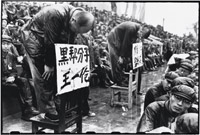
The Great Proletarian Cultural Revolution, which gripped China in
its tectonic embrace from 1966 to 1977, was one of the most traumatic political movements of the
20th century. Because it turned child on parent, friend on friend, and colleague on colleague,
it left a poisonous residue of unresolved grievances that even today have not dissipated.
The Chinese photographer Li Zhensheng lived through this period of
grand madness in Manchuria and not only covered it for his paper, the Heilongjiang Daily, but recorded what happened for history, hiding those negatives that were politically sensitive in a cache beneath his apartment floor.
If Li’s photos vividly show us how disruptive this interlude of extreme “communist” politics was, they also remind us how complicit the Chinese were in the brutality of Mao’s revolution. The still unsettled nature of this Chinese bout of self-delusion and self-destructiveness raises the question of whether it is possible for a people who have allowed themselves to abuse one another so savagely to simply move on through avoidance and forgetting into a healthy future.















